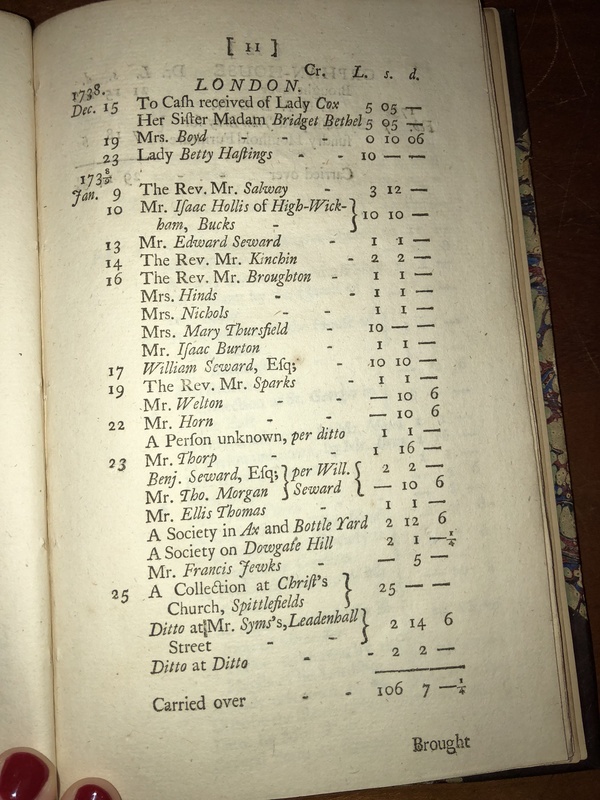An Account of Money Received and Disbursed for the Orphan- House in Georgia
George Whitefield explained his aspirations for the creation of the Orphan House in Savannah, along with the money involved through his personal accounts in his writing, An Account of the Money Received and Disbursed for the Orphan- House in Georgia. Within these writings Whitefield focuses more on why the Bethesda Orphan House is in debt, along with a list of people that made donations. Whitefield describes what led him to building Bethesda and all of the components that made it work. Throughout Whitefield’s writing he discusses that his intentions for opening this house were driven solely by his faith. He believes that “with a full Assurance of Faith, [he] may affirm the Lord put it into [his] heart to build this House” (Whitefield 1). He believes that the Lord led him to building this house and to use it for the souls and bodies of people at any age. When the house first started Whitefield wanted to only have about twenty people, but when he arrived in Georgia he saw how many people were in need of his help. Whitefield was able to pursue his dream through “the donations [which] allowed work to begin on what Whitefield called ‘Bethesda’ the ‘House of Mercy’” (Sanseri par. 3). The money given to him by donors is how he was able to make his dream come to life.
He had 49 children that were in his care at the time of this account; 23 English, 10 Scots, 4 Dutch, 5 French, and 7 Americans; 22 were fathers and mothers and there were 16 boys and 6 girls. The boys and girls were employed in the house by picking cotton, but the girls mostly did normal female chores such as knitting, washing, and cleaning house. Whitefield wanted to teach the children how to excel once they went into the real world and learn the value of money. Some examples of jobs that are available within the Orphan House include surgeons, women to help the sick people, people taking care of the hogs and cattle, shoemakers, labourers, and servants, to name some. Feeding more children than he originally planned on having drained the funds. Whitefield stated in his journal that “nearly forty children are under my care, and nearly a hundred mouths are daily supplied with food from our store…The expense is great, but our great and good God, I am persuaded, will enable me to defray it” (Sanseri par. 5). Supplying food to this many children and the workers of the Orphan House takes up a lot of the necessary funds to keep the house in working order. Whitefield wants to help as many people as he can which is why he has so many individuals in the Orphan House, but he needs assistance. The house received numerous contributions from Charleston, New England, New York, and Pennsylvania. After some time “disagreements arose between Whitefield and the trustees, who withdrew their support. The Supplies bound for the orphanage were stolen. Soon Whitefield owed about 500 pounds—20 year’s wages” (Sanseri par. 6). People began to doubt Whitefield’s true intentions of this Orphan House, so they withdrew the money that they were giving. Through his journals, Whitefield reveals that he is several pounds in debt on the Orphan House account and some friends have been generous enough to help him, but he believes that “I doubt not our Lord will enable me to pay them” (Whitefield 5). He believes that the Lord will provide them with what they need if it becomes an impending problem, but he is still receiving financial help from numerous people. This book contains a list of all the people that contributed financially to the Orphan House, along with what the contribution went towards. The purpose of this personal narrative is to show the people why he needs funding and what it will be put towards. He wants to encourage people to give financial contributions through his teachings of religion. He wants to show the people that he is instilling these children with necessary lessons that will help them to succeed in the real world. He is encouraging people to donate money for the betterment of future generations. Whitefield became overwhelmed with debt and felt as though it was “lying like a dead weight upon [him]”, which led him to purchasing a plantation in slaved in South Carolina so that he could earn funds to pay back his debt (Sanseri par. 8). He also worked to pay back his debt by raising money through his teachings.
